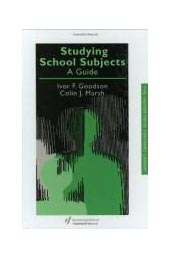Studying School Subjects: a guide
Conclusions, Complexities and Conjectures
In the battle to promote environmental studies we have seen how the rural studies advocates were barred from following the route to academic establishment. With no prospects of a scholarly discipline of environmental studies coming from the universities, the Hertfordshire advocates were forced into attempting to define 'a discipline' from the school level. This allowed opponents of the new subject, whilst broadly conceding its value to young and less able students, consistently to deny that it could be viewed as in any sense 'a scholarly discipline'. With a few exceptions school subject groups and university scholars of geography and, to a much lesser extent, biology, stuck firmly to the defence of subject integrity epitomised in Nicholls' speech to the Geographical Association. Considerations of an intellectual sort were thereby subordinated to the defence of subject territory which ensured that scholars and teachers of the subject would continue to benefit in terms of resources and career prospects.
COMPLEXITIES
In summarising the studies undertaken in this book it is important to examine whether the patterns of control discerned add up to 'domination' by powerful high-status groups as has been contended by M.F .D. Young et al in 'Knowledge and Control'[i] The role of dominant groups shows perhaps most clearly in the victory of the academic tradition in the early years of the twentieth century. This victory was embodied in the influential 1904 Regulations and most significantly, the 1917 School Certificate. Once established, however, these curricula patterns (and their associated financial and resource implications) were retained and defended in a much more complex way and by a wider range of agencies. It is therefore correct to assume that initially the rules for high-status knowledge reflected the values of dominant interest groups at that time. But it is quite another issue to assume that this is inevitably still the case or that is is dominant interest groups themselves who actively defend high-status curricula. It is perhaps useful to distinguish between domination and structure and mechanism and mediation.
By focusing on subjects in evolution and the conflict over 'A' level examinable knowledge the studies in this book clearly indicate the central role played by school subject groups. The most powerful of these agencies are those school subject groups promoting the academic tradition. Successfully in geography and biology, but unsuccessfully in environmental studies, these groups demanded the creation of an academic discipline based in the universities. The 'academic tradition' sub-groups act in this way because of the legacy of curricula, financial and resource structures inherited from the early twentieth century (when dominant interests were actively defended). Because of this legacy able pupils and academic examinations are linked and consequently resources, graded posts and career prospects are maximised for those who can claim academic status for their subject.
[i] M.F.D. Young (ed.), 'Knowledge and Control' (Collier Macmillan, 1971).
